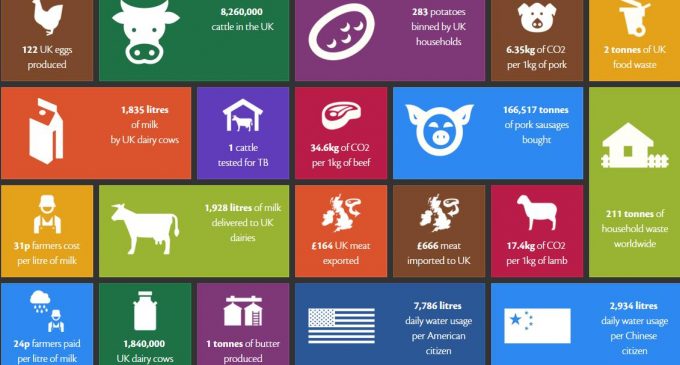Research shows real-time data of consumption impact

When we think about global warming many of us immediately think about cars and industry ruining the planet, but does this tell the whole story?
Figures highlighted by Farm Machinery Locator show that there are nearly 8.3 million cows in the UK alone; cattle which provide us with hundreds of thousands of litres of milk and thousands of pounds worth of beef every day. We often assume that agriculture is natural and therefore can’t be damaging to the environment, but that assessment is wrong.
This real-time data visualisation takes farming and consumption data and displays it in such a way that allows us to appreciate the true impact of our consumption. We can see the numbers rising rapidly before our very eyes, representing the staggering rate at which we are consuming meat and dairy.
The visualisation aims to raise awareness of the level at which we are currently consuming farmed meats, as it is widely regarded to be one of the driving forces behind increasing levels of carbon dioxide and deforestation.
LIVESTOCK’S CONTRIBUTION TO GLOBAL WARMING
In fact, if we look at figures published by the Food and Agriculture Organization of the United Nations, agriculture contributes 18% of the total release of greenhouse gases worldwide, a much higher figure than that for transportation. Emissions from cattle are particularly damaging because it is not CO2 that cows are releasing but methane. Every single cow releases between 70 and 120kg of methane per year and while this is a greenhouse gas like CO2, its detrimental impact on the planet is 23 times higher than the negative impact of CO2. In addition, livestock cause over two-thirds of the world’s ammonia emissions, and this greatly contributes to acid rain. When you consider there are over 1.5 billion cattle worldwide the damage quickly adds up.
Livestock figures are rising because of the general increase in our level of prosperity, which brings with it a higher demand for beef and milk. It’s not only emissions from cattle however that are causing problems to the planet, intensive farming also leads to a whole range of other environmental issues.
LAND CLEARANCE AND DEFORESTATION
Livestock now use over 30% of the world’s available land. Much of this is used for grazing although there is also a substantial portion which is utilised to grow feed. A need for all this space has been a major contributor to deforestation and with deforestation a further release of CO2 into the atmosphere occurs. This comes about due to two main reasons. First, as the trees are cut down, the carbon dioxide they store is released. Second, fewer trees leads to lower levels of photosynthesis going forward, a process which would normally help to absorb carbon dioxide from the atmosphere. In addition, once land has been cleared if it is then overgrazed it runs the risk of turning to desert. This has already happened on 20% of pastureland.
DROUGHT
Cows also use a substantial amount of water. It requires 990 litres of water to produce just one litre of milk and as global warming continues an upward trend our water becomes ever more precious. Furthermore many of the antibiotics and hormones used to treat cattle can end up in drinking water and lead to risks to human health.
POLLUTION
There will always be a level of pollution produced by livestock and ultimately this will wash down to sea level. Nutrient run off causes an overgrowth of algae which consumes oxygen in the sea, oxygen which marine life needs to survive. This can kill coral reefs and lead to so called ‘dead zones’. One in the Gulf of Mexico is around 6,500 square miles in area and has predominantly been caused by US beef production waste which is then carried down to the coast by the Mississippi.
We all need to lower our carbon footprint and when we realise how much of an impact agriculture has on the environment we should consider reducing the amount of meat and milk we consume. The planet’s population is growing substantially every year and a western diet which is meat and dairy heavy, is widening its appeal even in countries where fruits and vegetables used to be the mainstay of meals. If we want to become greener in all areas of our lives we should all be a little more aware of the detrimental impact our own consumption of meat and milk is having and take steps to reduce it.
In August 2013, Focus Business Media launched Farm Machinery Locator – a classified only magazine published fortnightly and sold at newsagents across the UK.

































